BTEC HND Business Unit 18: Impact of Globalization on Operations
VerifiedAdded on 2022/12/26
|14
|3897
|67
Report
AI Summary
This report analyzes the impact of globalization on business operations, focusing on key factors driving global commerce, strategic challenges faced by organizations, and the influences of globalization on organizational governance, leadership, structure, culture, and functions. The report examines ethical and sustainable globalization's impact on company functions, explores decision-making in a global context, and articulates various internationalization routes and barriers. Using RCS logistics as a case study, the report delves into economies of scale, market reach, and growth strategies. It also addresses challenges like international trade law, technological changes, and managing global teams. The influence of globalization on organizational governance, leadership, and culture is explored, along with the impacts of ethics and sustainability on company functions. The report concludes with a comprehensive overview of how globalization reshapes business strategies and operations.
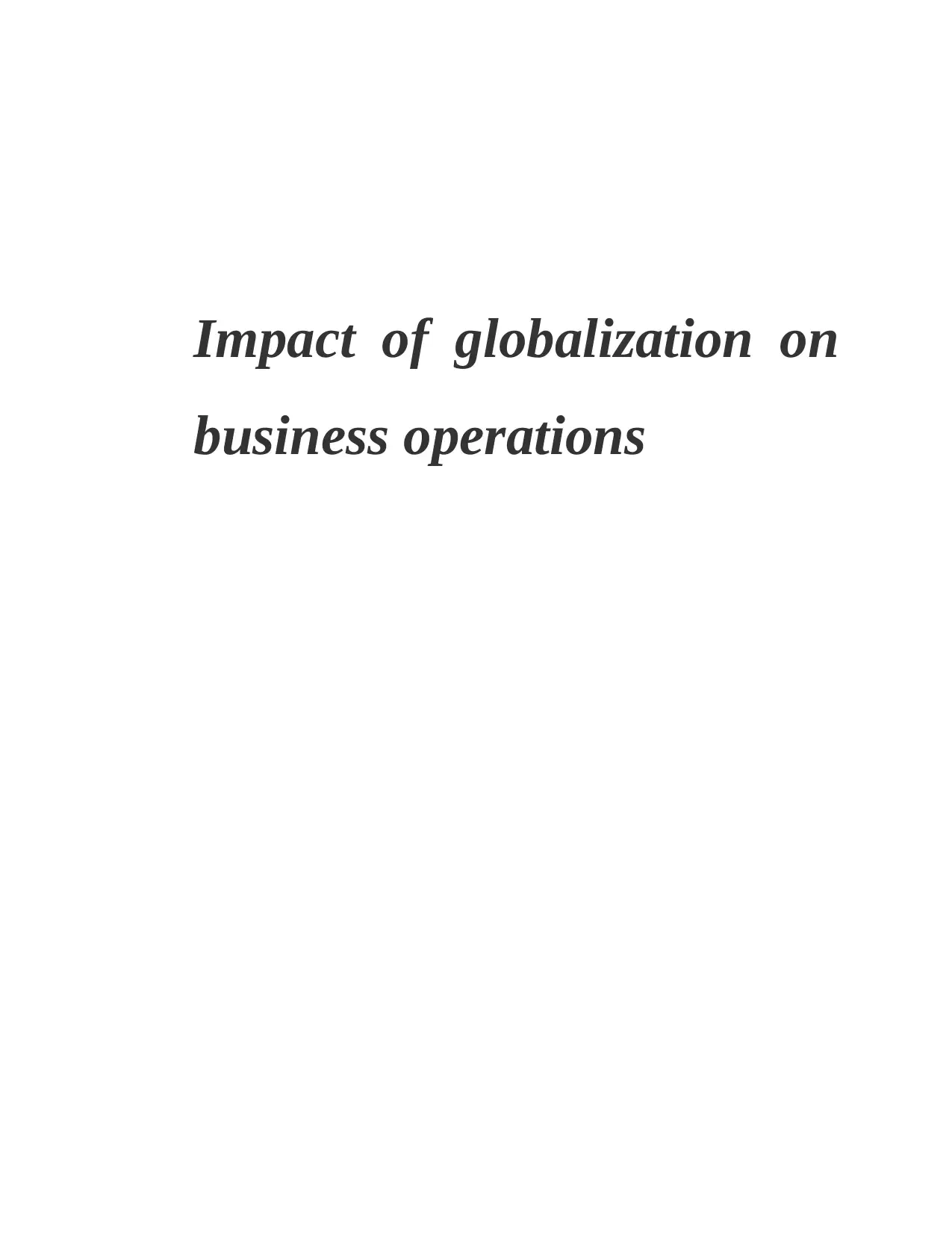
Impact of globalization on
business operations
business operations
Paraphrase This Document
Need a fresh take? Get an instant paraphrase of this document with our AI Paraphraser
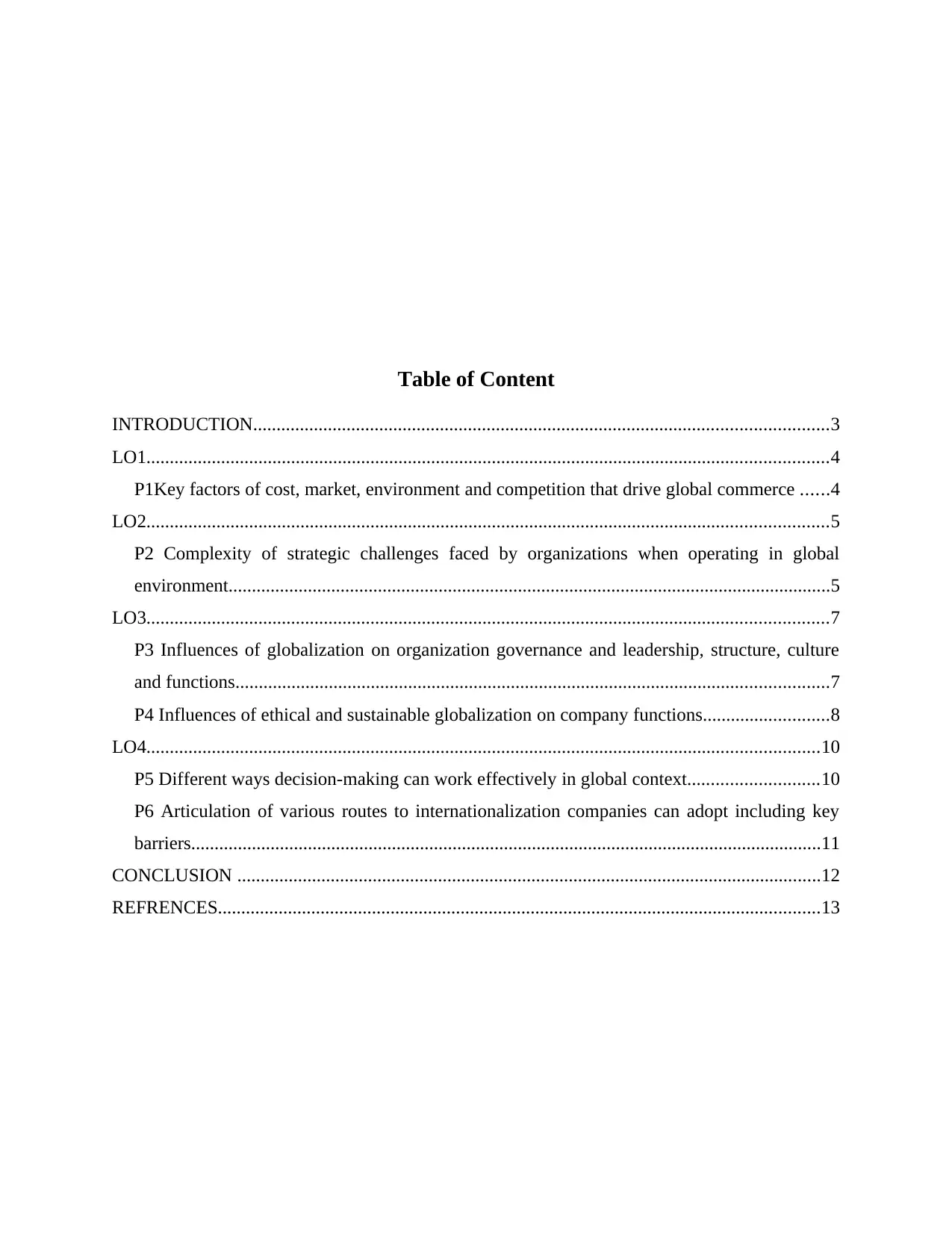
Table of Content
INTRODUCTION...........................................................................................................................3
LO1..................................................................................................................................................4
P1Key factors of cost, market, environment and competition that drive global commerce ......4
LO2..................................................................................................................................................5
P2 Complexity of strategic challenges faced by organizations when operating in global
environment.................................................................................................................................5
LO3..................................................................................................................................................7
P3 Influences of globalization on organization governance and leadership, structure, culture
and functions...............................................................................................................................7
P4 Influences of ethical and sustainable globalization on company functions...........................8
LO4................................................................................................................................................10
P5 Different ways decision-making can work effectively in global context............................10
P6 Articulation of various routes to internationalization companies can adopt including key
barriers.......................................................................................................................................11
CONCLUSION .............................................................................................................................12
REFRENCES.................................................................................................................................13
INTRODUCTION...........................................................................................................................3
LO1..................................................................................................................................................4
P1Key factors of cost, market, environment and competition that drive global commerce ......4
LO2..................................................................................................................................................5
P2 Complexity of strategic challenges faced by organizations when operating in global
environment.................................................................................................................................5
LO3..................................................................................................................................................7
P3 Influences of globalization on organization governance and leadership, structure, culture
and functions...............................................................................................................................7
P4 Influences of ethical and sustainable globalization on company functions...........................8
LO4................................................................................................................................................10
P5 Different ways decision-making can work effectively in global context............................10
P6 Articulation of various routes to internationalization companies can adopt including key
barriers.......................................................................................................................................11
CONCLUSION .............................................................................................................................12
REFRENCES.................................................................................................................................13
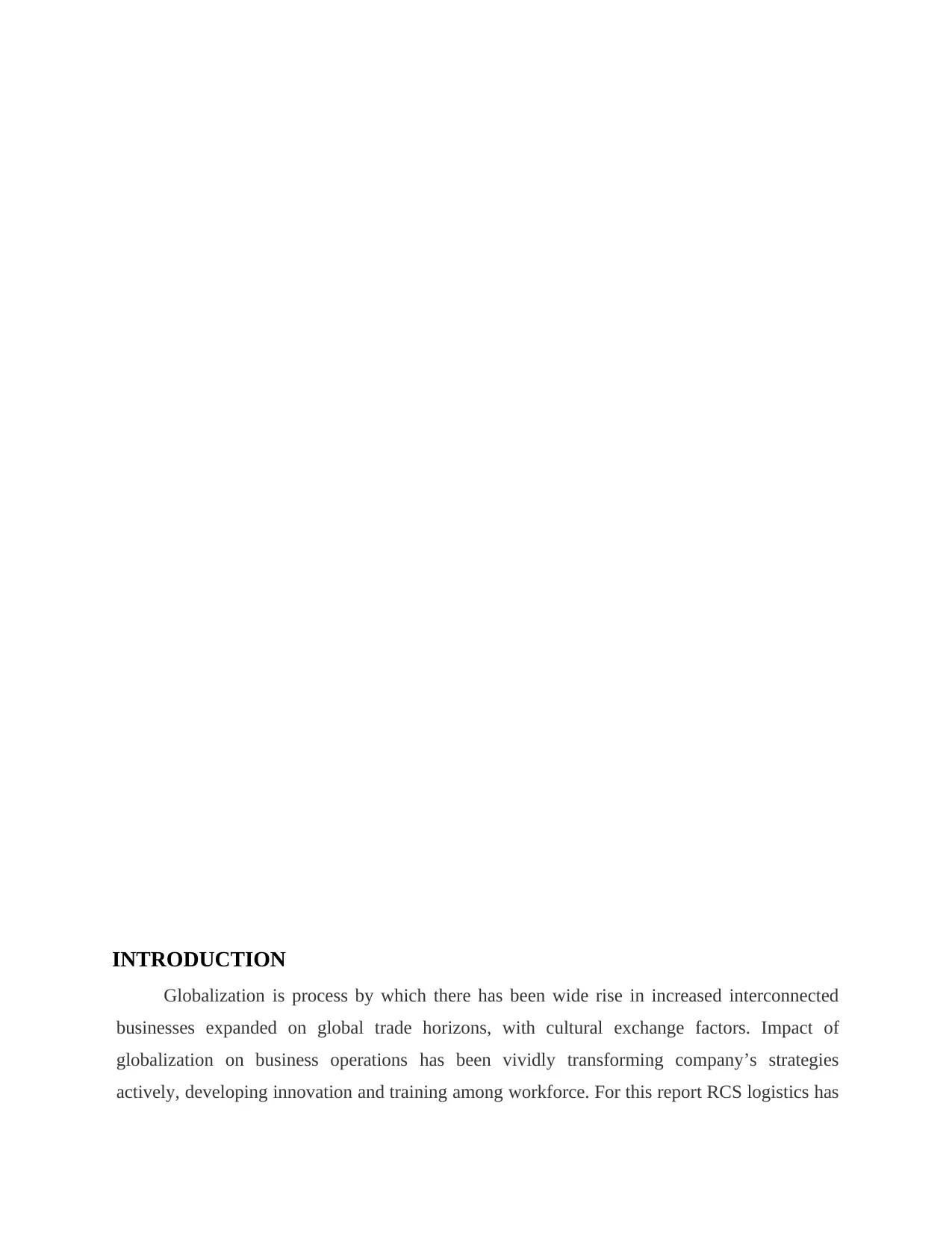
INTRODUCTION
Globalization is process by which there has been wide rise in increased interconnected
businesses expanded on global trade horizons, with cultural exchange factors. Impact of
globalization on business operations has been vividly transforming company’s strategies
actively, developing innovation and training among workforce. For this report RCS logistics has
Globalization is process by which there has been wide rise in increased interconnected
businesses expanded on global trade horizons, with cultural exchange factors. Impact of
globalization on business operations has been vividly transforming company’s strategies
actively, developing innovation and training among workforce. For this report RCS logistics has
⊘ This is a preview!⊘
Do you want full access?
Subscribe today to unlock all pages.

Trusted by 1+ million students worldwide
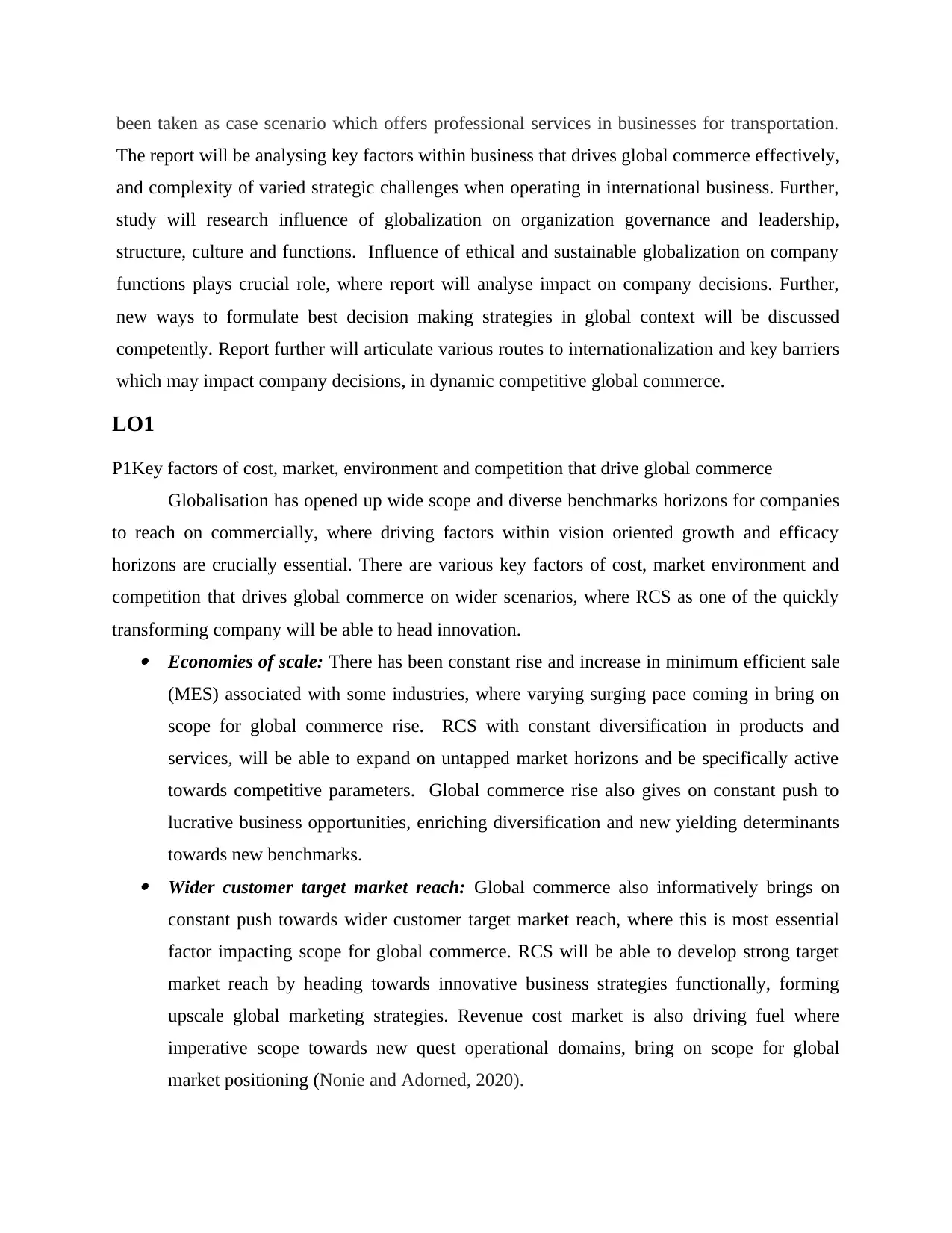
been taken as case scenario which offers professional services in businesses for transportation.
The report will be analysing key factors within business that drives global commerce effectively,
and complexity of varied strategic challenges when operating in international business. Further,
study will research influence of globalization on organization governance and leadership,
structure, culture and functions. Influence of ethical and sustainable globalization on company
functions plays crucial role, where report will analyse impact on company decisions. Further,
new ways to formulate best decision making strategies in global context will be discussed
competently. Report further will articulate various routes to internationalization and key barriers
which may impact company decisions, in dynamic competitive global commerce.
LO1
P1Key factors of cost, market, environment and competition that drive global commerce
Globalisation has opened up wide scope and diverse benchmarks horizons for companies
to reach on commercially, where driving factors within vision oriented growth and efficacy
horizons are crucially essential. There are various key factors of cost, market environment and
competition that drives global commerce on wider scenarios, where RCS as one of the quickly
transforming company will be able to head innovation. Economies of scale: There has been constant rise and increase in minimum efficient sale
(MES) associated with some industries, where varying surging pace coming in bring on
scope for global commerce rise. RCS with constant diversification in products and
services, will be able to expand on untapped market horizons and be specifically active
towards competitive parameters. Global commerce rise also gives on constant push to
lucrative business opportunities, enriching diversification and new yielding determinants
towards new benchmarks. Wider customer target market reach: Global commerce also informatively brings on
constant push towards wider customer target market reach, where this is most essential
factor impacting scope for global commerce. RCS will be able to develop strong target
market reach by heading towards innovative business strategies functionally, forming
upscale global marketing strategies. Revenue cost market is also driving fuel where
imperative scope towards new quest operational domains, bring on scope for global
market positioning (Nonie and Adorned, 2020).
The report will be analysing key factors within business that drives global commerce effectively,
and complexity of varied strategic challenges when operating in international business. Further,
study will research influence of globalization on organization governance and leadership,
structure, culture and functions. Influence of ethical and sustainable globalization on company
functions plays crucial role, where report will analyse impact on company decisions. Further,
new ways to formulate best decision making strategies in global context will be discussed
competently. Report further will articulate various routes to internationalization and key barriers
which may impact company decisions, in dynamic competitive global commerce.
LO1
P1Key factors of cost, market, environment and competition that drive global commerce
Globalisation has opened up wide scope and diverse benchmarks horizons for companies
to reach on commercially, where driving factors within vision oriented growth and efficacy
horizons are crucially essential. There are various key factors of cost, market environment and
competition that drives global commerce on wider scenarios, where RCS as one of the quickly
transforming company will be able to head innovation. Economies of scale: There has been constant rise and increase in minimum efficient sale
(MES) associated with some industries, where varying surging pace coming in bring on
scope for global commerce rise. RCS with constant diversification in products and
services, will be able to expand on untapped market horizons and be specifically active
towards competitive parameters. Global commerce rise also gives on constant push to
lucrative business opportunities, enriching diversification and new yielding determinants
towards new benchmarks. Wider customer target market reach: Global commerce also informatively brings on
constant push towards wider customer target market reach, where this is most essential
factor impacting scope for global commerce. RCS will be able to develop strong target
market reach by heading towards innovative business strategies functionally, forming
upscale global marketing strategies. Revenue cost market is also driving fuel where
imperative scope towards new quest operational domains, bring on scope for global
market positioning (Nonie and Adorned, 2020).
Paraphrase This Document
Need a fresh take? Get an instant paraphrase of this document with our AI Paraphraser
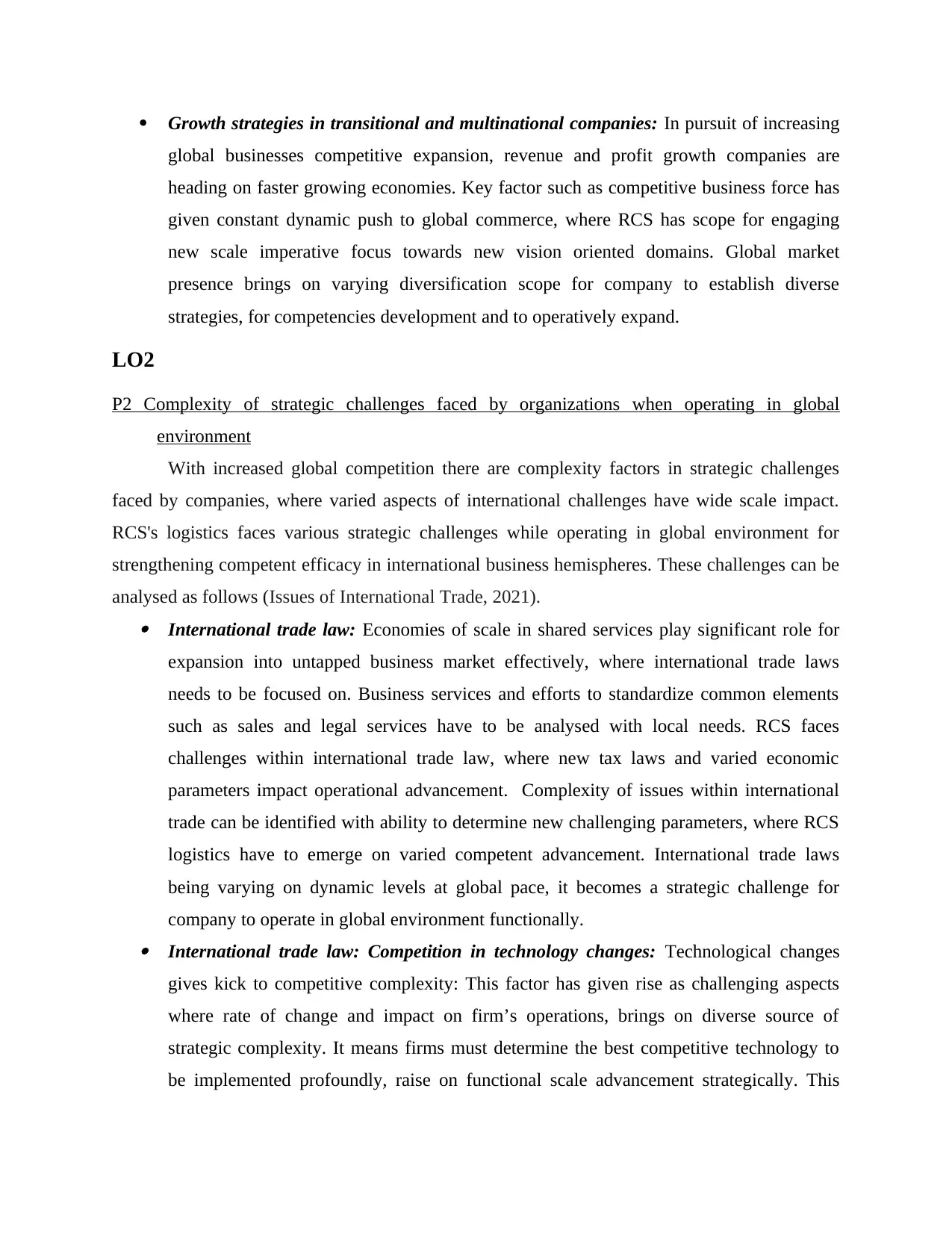
Growth strategies in transitional and multinational companies: In pursuit of increasing
global businesses competitive expansion, revenue and profit growth companies are
heading on faster growing economies. Key factor such as competitive business force has
given constant dynamic push to global commerce, where RCS has scope for engaging
new scale imperative focus towards new vision oriented domains. Global market
presence brings on varying diversification scope for company to establish diverse
strategies, for competencies development and to operatively expand.
LO2
P2 Complexity of strategic challenges faced by organizations when operating in global
environment
With increased global competition there are complexity factors in strategic challenges
faced by companies, where varied aspects of international challenges have wide scale impact.
RCS's logistics faces various strategic challenges while operating in global environment for
strengthening competent efficacy in international business hemispheres. These challenges can be
analysed as follows (Issues of International Trade, 2021). International trade law: Economies of scale in shared services play significant role for
expansion into untapped business market effectively, where international trade laws
needs to be focused on. Business services and efforts to standardize common elements
such as sales and legal services have to be analysed with local needs. RCS faces
challenges within international trade law, where new tax laws and varied economic
parameters impact operational advancement. Complexity of issues within international
trade can be identified with ability to determine new challenging parameters, where RCS
logistics have to emerge on varied competent advancement. International trade laws
being varying on dynamic levels at global pace, it becomes a strategic challenge for
company to operate in global environment functionally. International trade law: Competition in technology changes: Technological changes
gives kick to competitive complexity: This factor has given rise as challenging aspects
where rate of change and impact on firm’s operations, brings on diverse source of
strategic complexity. It means firms must determine the best competitive technology to
be implemented profoundly, raise on functional scale advancement strategically. This
global businesses competitive expansion, revenue and profit growth companies are
heading on faster growing economies. Key factor such as competitive business force has
given constant dynamic push to global commerce, where RCS has scope for engaging
new scale imperative focus towards new vision oriented domains. Global market
presence brings on varying diversification scope for company to establish diverse
strategies, for competencies development and to operatively expand.
LO2
P2 Complexity of strategic challenges faced by organizations when operating in global
environment
With increased global competition there are complexity factors in strategic challenges
faced by companies, where varied aspects of international challenges have wide scale impact.
RCS's logistics faces various strategic challenges while operating in global environment for
strengthening competent efficacy in international business hemispheres. These challenges can be
analysed as follows (Issues of International Trade, 2021). International trade law: Economies of scale in shared services play significant role for
expansion into untapped business market effectively, where international trade laws
needs to be focused on. Business services and efforts to standardize common elements
such as sales and legal services have to be analysed with local needs. RCS faces
challenges within international trade law, where new tax laws and varied economic
parameters impact operational advancement. Complexity of issues within international
trade can be identified with ability to determine new challenging parameters, where RCS
logistics have to emerge on varied competent advancement. International trade laws
being varying on dynamic levels at global pace, it becomes a strategic challenge for
company to operate in global environment functionally. International trade law: Competition in technology changes: Technological changes
gives kick to competitive complexity: This factor has given rise as challenging aspects
where rate of change and impact on firm’s operations, brings on diverse source of
strategic complexity. It means firms must determine the best competitive technology to
be implemented profoundly, raise on functional scale advancement strategically. This
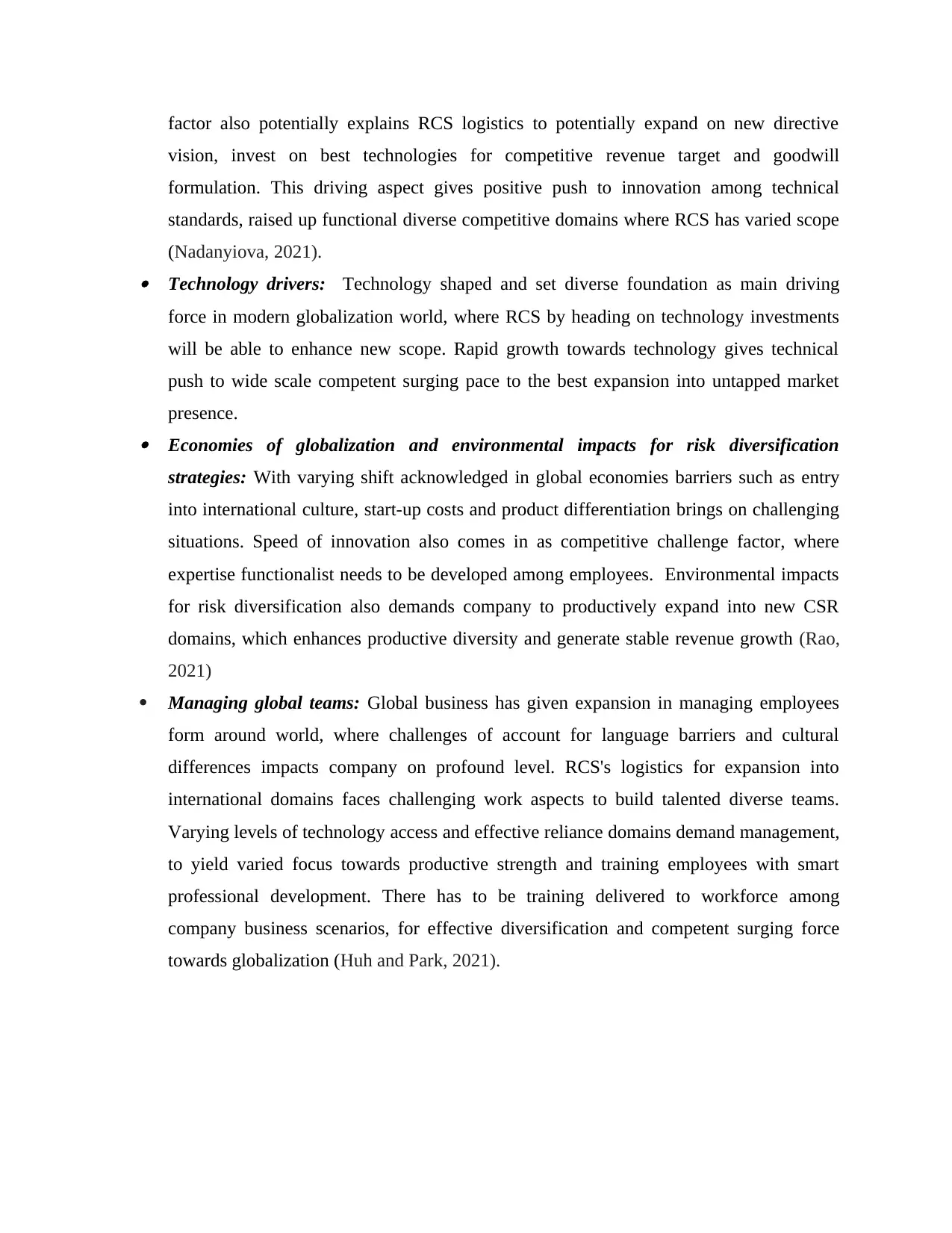
factor also potentially explains RCS logistics to potentially expand on new directive
vision, invest on best technologies for competitive revenue target and goodwill
formulation. This driving aspect gives positive push to innovation among technical
standards, raised up functional diverse competitive domains where RCS has varied scope
(Nadanyiova, 2021). Technology drivers: Technology shaped and set diverse foundation as main driving
force in modern globalization world, where RCS by heading on technology investments
will be able to enhance new scope. Rapid growth towards technology gives technical
push to wide scale competent surging pace to the best expansion into untapped market
presence. Economies of globalization and environmental impacts for risk diversification
strategies: With varying shift acknowledged in global economies barriers such as entry
into international culture, start-up costs and product differentiation brings on challenging
situations. Speed of innovation also comes in as competitive challenge factor, where
expertise functionalist needs to be developed among employees. Environmental impacts
for risk diversification also demands company to productively expand into new CSR
domains, which enhances productive diversity and generate stable revenue growth (Rao,
2021)
Managing global teams: Global business has given expansion in managing employees
form around world, where challenges of account for language barriers and cultural
differences impacts company on profound level. RCS's logistics for expansion into
international domains faces challenging work aspects to build talented diverse teams.
Varying levels of technology access and effective reliance domains demand management,
to yield varied focus towards productive strength and training employees with smart
professional development. There has to be training delivered to workforce among
company business scenarios, for effective diversification and competent surging force
towards globalization (Huh and Park, 2021).
vision, invest on best technologies for competitive revenue target and goodwill
formulation. This driving aspect gives positive push to innovation among technical
standards, raised up functional diverse competitive domains where RCS has varied scope
(Nadanyiova, 2021). Technology drivers: Technology shaped and set diverse foundation as main driving
force in modern globalization world, where RCS by heading on technology investments
will be able to enhance new scope. Rapid growth towards technology gives technical
push to wide scale competent surging pace to the best expansion into untapped market
presence. Economies of globalization and environmental impacts for risk diversification
strategies: With varying shift acknowledged in global economies barriers such as entry
into international culture, start-up costs and product differentiation brings on challenging
situations. Speed of innovation also comes in as competitive challenge factor, where
expertise functionalist needs to be developed among employees. Environmental impacts
for risk diversification also demands company to productively expand into new CSR
domains, which enhances productive diversity and generate stable revenue growth (Rao,
2021)
Managing global teams: Global business has given expansion in managing employees
form around world, where challenges of account for language barriers and cultural
differences impacts company on profound level. RCS's logistics for expansion into
international domains faces challenging work aspects to build talented diverse teams.
Varying levels of technology access and effective reliance domains demand management,
to yield varied focus towards productive strength and training employees with smart
professional development. There has to be training delivered to workforce among
company business scenarios, for effective diversification and competent surging force
towards globalization (Huh and Park, 2021).
⊘ This is a preview!⊘
Do you want full access?
Subscribe today to unlock all pages.

Trusted by 1+ million students worldwide
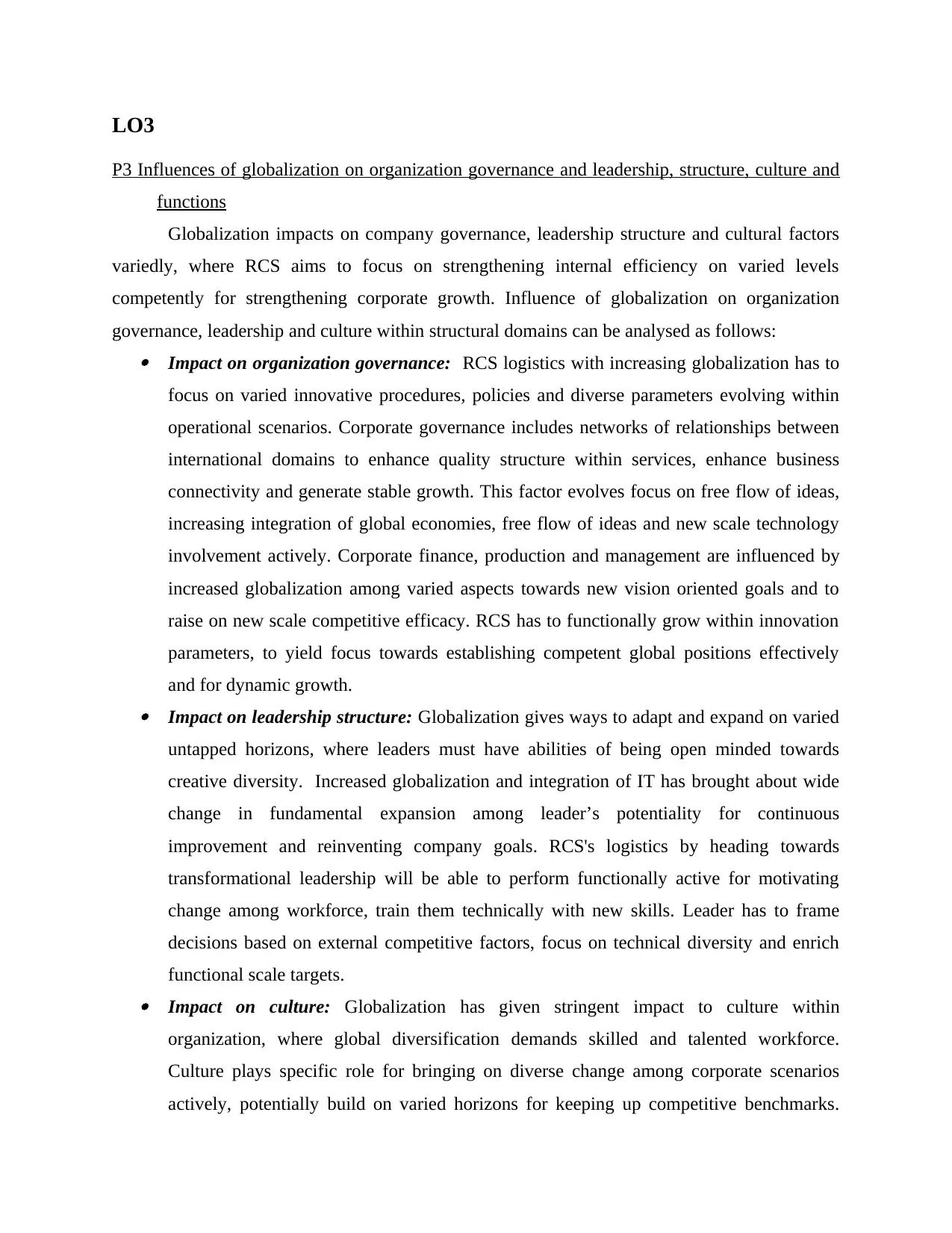
LO3
P3 Influences of globalization on organization governance and leadership, structure, culture and
functions
Globalization impacts on company governance, leadership structure and cultural factors
variedly, where RCS aims to focus on strengthening internal efficiency on varied levels
competently for strengthening corporate growth. Influence of globalization on organization
governance, leadership and culture within structural domains can be analysed as follows: Impact on organization governance: RCS logistics with increasing globalization has to
focus on varied innovative procedures, policies and diverse parameters evolving within
operational scenarios. Corporate governance includes networks of relationships between
international domains to enhance quality structure within services, enhance business
connectivity and generate stable growth. This factor evolves focus on free flow of ideas,
increasing integration of global economies, free flow of ideas and new scale technology
involvement actively. Corporate finance, production and management are influenced by
increased globalization among varied aspects towards new vision oriented goals and to
raise on new scale competitive efficacy. RCS has to functionally grow within innovation
parameters, to yield focus towards establishing competent global positions effectively
and for dynamic growth. Impact on leadership structure: Globalization gives ways to adapt and expand on varied
untapped horizons, where leaders must have abilities of being open minded towards
creative diversity. Increased globalization and integration of IT has brought about wide
change in fundamental expansion among leader’s potentiality for continuous
improvement and reinventing company goals. RCS's logistics by heading towards
transformational leadership will be able to perform functionally active for motivating
change among workforce, train them technically with new skills. Leader has to frame
decisions based on external competitive factors, focus on technical diversity and enrich
functional scale targets. Impact on culture: Globalization has given stringent impact to culture within
organization, where global diversification demands skilled and talented workforce.
Culture plays specific role for bringing on diverse change among corporate scenarios
actively, potentially build on varied horizons for keeping up competitive benchmarks.
P3 Influences of globalization on organization governance and leadership, structure, culture and
functions
Globalization impacts on company governance, leadership structure and cultural factors
variedly, where RCS aims to focus on strengthening internal efficiency on varied levels
competently for strengthening corporate growth. Influence of globalization on organization
governance, leadership and culture within structural domains can be analysed as follows: Impact on organization governance: RCS logistics with increasing globalization has to
focus on varied innovative procedures, policies and diverse parameters evolving within
operational scenarios. Corporate governance includes networks of relationships between
international domains to enhance quality structure within services, enhance business
connectivity and generate stable growth. This factor evolves focus on free flow of ideas,
increasing integration of global economies, free flow of ideas and new scale technology
involvement actively. Corporate finance, production and management are influenced by
increased globalization among varied aspects towards new vision oriented goals and to
raise on new scale competitive efficacy. RCS has to functionally grow within innovation
parameters, to yield focus towards establishing competent global positions effectively
and for dynamic growth. Impact on leadership structure: Globalization gives ways to adapt and expand on varied
untapped horizons, where leaders must have abilities of being open minded towards
creative diversity. Increased globalization and integration of IT has brought about wide
change in fundamental expansion among leader’s potentiality for continuous
improvement and reinventing company goals. RCS's logistics by heading towards
transformational leadership will be able to perform functionally active for motivating
change among workforce, train them technically with new skills. Leader has to frame
decisions based on external competitive factors, focus on technical diversity and enrich
functional scale targets. Impact on culture: Globalization has given stringent impact to culture within
organization, where global diversification demands skilled and talented workforce.
Culture plays specific role for bringing on diverse change among corporate scenarios
actively, potentially build on varied horizons for keeping up competitive benchmarks.
Paraphrase This Document
Need a fresh take? Get an instant paraphrase of this document with our AI Paraphraser
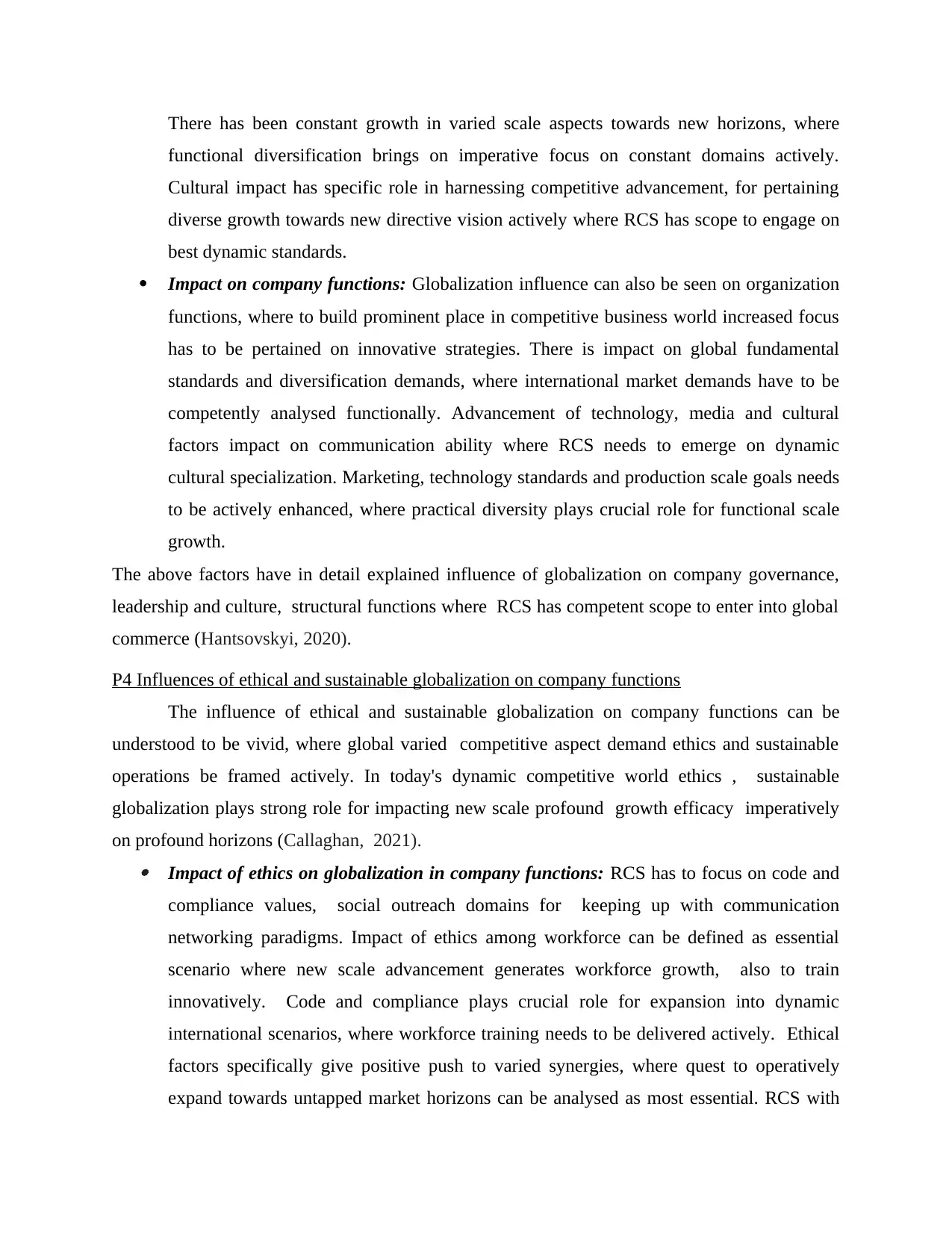
There has been constant growth in varied scale aspects towards new horizons, where
functional diversification brings on imperative focus on constant domains actively.
Cultural impact has specific role in harnessing competitive advancement, for pertaining
diverse growth towards new directive vision actively where RCS has scope to engage on
best dynamic standards.
Impact on company functions: Globalization influence can also be seen on organization
functions, where to build prominent place in competitive business world increased focus
has to be pertained on innovative strategies. There is impact on global fundamental
standards and diversification demands, where international market demands have to be
competently analysed functionally. Advancement of technology, media and cultural
factors impact on communication ability where RCS needs to emerge on dynamic
cultural specialization. Marketing, technology standards and production scale goals needs
to be actively enhanced, where practical diversity plays crucial role for functional scale
growth.
The above factors have in detail explained influence of globalization on company governance,
leadership and culture, structural functions where RCS has competent scope to enter into global
commerce (Hantsovskyi, 2020).
P4 Influences of ethical and sustainable globalization on company functions
The influence of ethical and sustainable globalization on company functions can be
understood to be vivid, where global varied competitive aspect demand ethics and sustainable
operations be framed actively. In today's dynamic competitive world ethics , sustainable
globalization plays strong role for impacting new scale profound growth efficacy imperatively
on profound horizons (Callaghan, 2021). Impact of ethics on globalization in company functions: RCS has to focus on code and
compliance values, social outreach domains for keeping up with communication
networking paradigms. Impact of ethics among workforce can be defined as essential
scenario where new scale advancement generates workforce growth, also to train
innovatively. Code and compliance plays crucial role for expansion into dynamic
international scenarios, where workforce training needs to be delivered actively. Ethical
factors specifically give positive push to varied synergies, where quest to operatively
expand towards untapped market horizons can be analysed as most essential. RCS with
functional diversification brings on imperative focus on constant domains actively.
Cultural impact has specific role in harnessing competitive advancement, for pertaining
diverse growth towards new directive vision actively where RCS has scope to engage on
best dynamic standards.
Impact on company functions: Globalization influence can also be seen on organization
functions, where to build prominent place in competitive business world increased focus
has to be pertained on innovative strategies. There is impact on global fundamental
standards and diversification demands, where international market demands have to be
competently analysed functionally. Advancement of technology, media and cultural
factors impact on communication ability where RCS needs to emerge on dynamic
cultural specialization. Marketing, technology standards and production scale goals needs
to be actively enhanced, where practical diversity plays crucial role for functional scale
growth.
The above factors have in detail explained influence of globalization on company governance,
leadership and culture, structural functions where RCS has competent scope to enter into global
commerce (Hantsovskyi, 2020).
P4 Influences of ethical and sustainable globalization on company functions
The influence of ethical and sustainable globalization on company functions can be
understood to be vivid, where global varied competitive aspect demand ethics and sustainable
operations be framed actively. In today's dynamic competitive world ethics , sustainable
globalization plays strong role for impacting new scale profound growth efficacy imperatively
on profound horizons (Callaghan, 2021). Impact of ethics on globalization in company functions: RCS has to focus on code and
compliance values, social outreach domains for keeping up with communication
networking paradigms. Impact of ethics among workforce can be defined as essential
scenario where new scale advancement generates workforce growth, also to train
innovatively. Code and compliance plays crucial role for expansion into dynamic
international scenarios, where workforce training needs to be delivered actively. Ethical
factors specifically give positive push to varied synergies, where quest to operatively
expand towards untapped market horizons can be analysed as most essential. RCS with
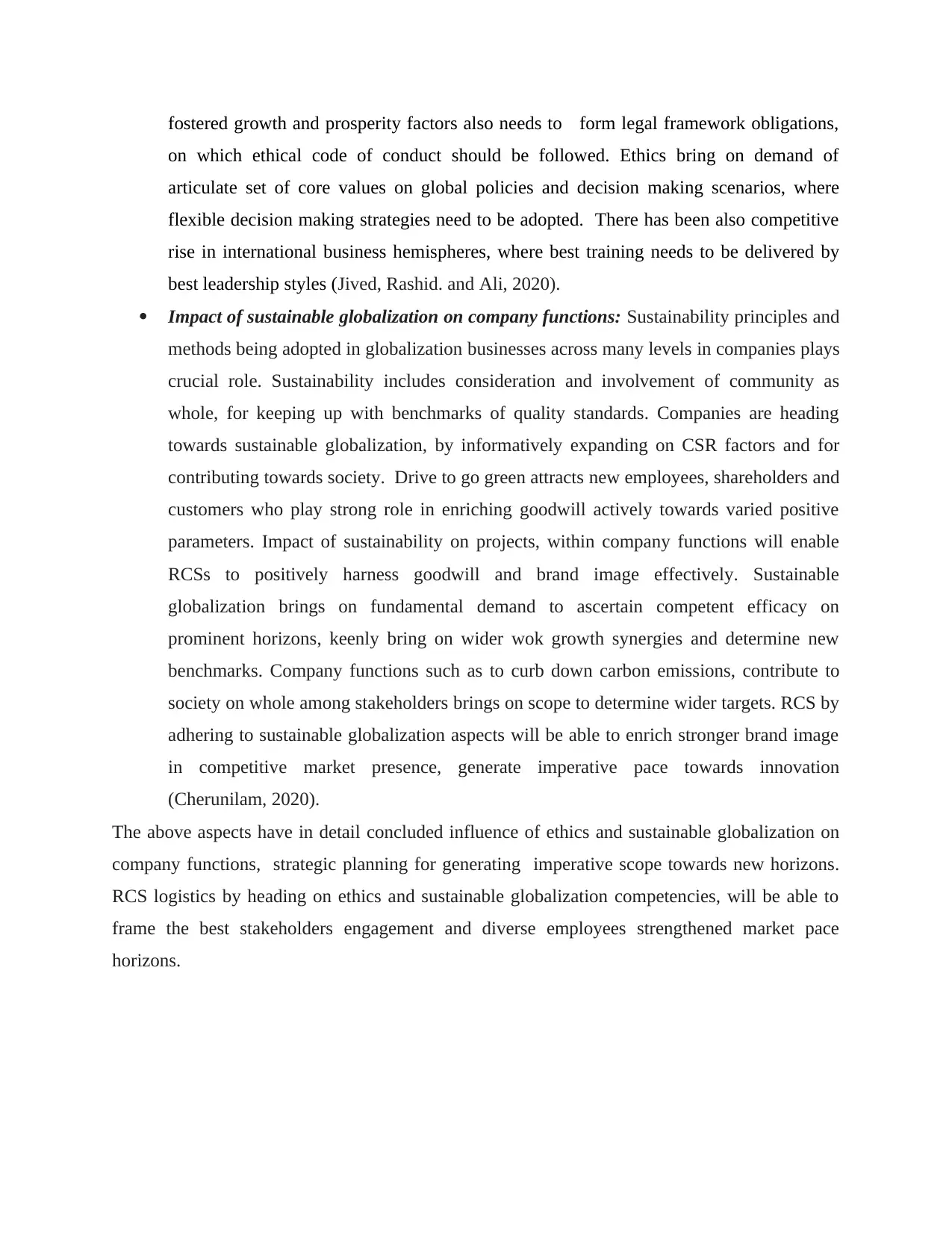
fostered growth and prosperity factors also needs to form legal framework obligations,
on which ethical code of conduct should be followed. Ethics bring on demand of
articulate set of core values on global policies and decision making scenarios, where
flexible decision making strategies need to be adopted. There has been also competitive
rise in international business hemispheres, where best training needs to be delivered by
best leadership styles (Jived, Rashid. and Ali, 2020).
Impact of sustainable globalization on company functions: Sustainability principles and
methods being adopted in globalization businesses across many levels in companies plays
crucial role. Sustainability includes consideration and involvement of community as
whole, for keeping up with benchmarks of quality standards. Companies are heading
towards sustainable globalization, by informatively expanding on CSR factors and for
contributing towards society. Drive to go green attracts new employees, shareholders and
customers who play strong role in enriching goodwill actively towards varied positive
parameters. Impact of sustainability on projects, within company functions will enable
RCSs to positively harness goodwill and brand image effectively. Sustainable
globalization brings on fundamental demand to ascertain competent efficacy on
prominent horizons, keenly bring on wider wok growth synergies and determine new
benchmarks. Company functions such as to curb down carbon emissions, contribute to
society on whole among stakeholders brings on scope to determine wider targets. RCS by
adhering to sustainable globalization aspects will be able to enrich stronger brand image
in competitive market presence, generate imperative pace towards innovation
(Cherunilam, 2020).
The above aspects have in detail concluded influence of ethics and sustainable globalization on
company functions, strategic planning for generating imperative scope towards new horizons.
RCS logistics by heading on ethics and sustainable globalization competencies, will be able to
frame the best stakeholders engagement and diverse employees strengthened market pace
horizons.
on which ethical code of conduct should be followed. Ethics bring on demand of
articulate set of core values on global policies and decision making scenarios, where
flexible decision making strategies need to be adopted. There has been also competitive
rise in international business hemispheres, where best training needs to be delivered by
best leadership styles (Jived, Rashid. and Ali, 2020).
Impact of sustainable globalization on company functions: Sustainability principles and
methods being adopted in globalization businesses across many levels in companies plays
crucial role. Sustainability includes consideration and involvement of community as
whole, for keeping up with benchmarks of quality standards. Companies are heading
towards sustainable globalization, by informatively expanding on CSR factors and for
contributing towards society. Drive to go green attracts new employees, shareholders and
customers who play strong role in enriching goodwill actively towards varied positive
parameters. Impact of sustainability on projects, within company functions will enable
RCSs to positively harness goodwill and brand image effectively. Sustainable
globalization brings on fundamental demand to ascertain competent efficacy on
prominent horizons, keenly bring on wider wok growth synergies and determine new
benchmarks. Company functions such as to curb down carbon emissions, contribute to
society on whole among stakeholders brings on scope to determine wider targets. RCS by
adhering to sustainable globalization aspects will be able to enrich stronger brand image
in competitive market presence, generate imperative pace towards innovation
(Cherunilam, 2020).
The above aspects have in detail concluded influence of ethics and sustainable globalization on
company functions, strategic planning for generating imperative scope towards new horizons.
RCS logistics by heading on ethics and sustainable globalization competencies, will be able to
frame the best stakeholders engagement and diverse employees strengthened market pace
horizons.
⊘ This is a preview!⊘
Do you want full access?
Subscribe today to unlock all pages.

Trusted by 1+ million students worldwide
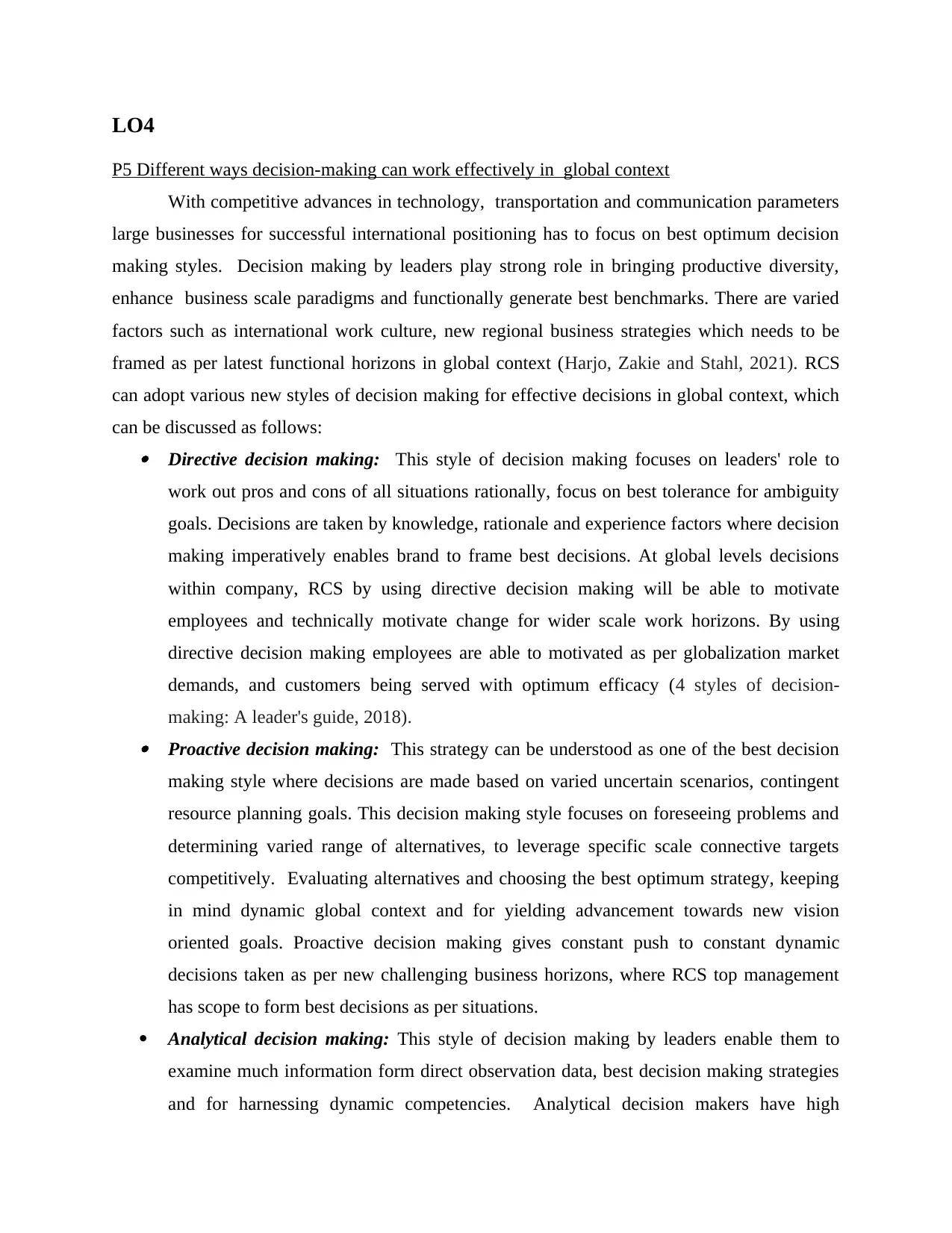
LO4
P5 Different ways decision-making can work effectively in global context
With competitive advances in technology, transportation and communication parameters
large businesses for successful international positioning has to focus on best optimum decision
making styles. Decision making by leaders play strong role in bringing productive diversity,
enhance business scale paradigms and functionally generate best benchmarks. There are varied
factors such as international work culture, new regional business strategies which needs to be
framed as per latest functional horizons in global context (Harjo, Zakie and Stahl, 2021). RCS
can adopt various new styles of decision making for effective decisions in global context, which
can be discussed as follows: Directive decision making: This style of decision making focuses on leaders' role to
work out pros and cons of all situations rationally, focus on best tolerance for ambiguity
goals. Decisions are taken by knowledge, rationale and experience factors where decision
making imperatively enables brand to frame best decisions. At global levels decisions
within company, RCS by using directive decision making will be able to motivate
employees and technically motivate change for wider scale work horizons. By using
directive decision making employees are able to motivated as per globalization market
demands, and customers being served with optimum efficacy (4 styles of decision-
making: A leader's guide, 2018). Proactive decision making: This strategy can be understood as one of the best decision
making style where decisions are made based on varied uncertain scenarios, contingent
resource planning goals. This decision making style focuses on foreseeing problems and
determining varied range of alternatives, to leverage specific scale connective targets
competitively. Evaluating alternatives and choosing the best optimum strategy, keeping
in mind dynamic global context and for yielding advancement towards new vision
oriented goals. Proactive decision making gives constant push to constant dynamic
decisions taken as per new challenging business horizons, where RCS top management
has scope to form best decisions as per situations.
Analytical decision making: This style of decision making by leaders enable them to
examine much information form direct observation data, best decision making strategies
and for harnessing dynamic competencies. Analytical decision makers have high
P5 Different ways decision-making can work effectively in global context
With competitive advances in technology, transportation and communication parameters
large businesses for successful international positioning has to focus on best optimum decision
making styles. Decision making by leaders play strong role in bringing productive diversity,
enhance business scale paradigms and functionally generate best benchmarks. There are varied
factors such as international work culture, new regional business strategies which needs to be
framed as per latest functional horizons in global context (Harjo, Zakie and Stahl, 2021). RCS
can adopt various new styles of decision making for effective decisions in global context, which
can be discussed as follows: Directive decision making: This style of decision making focuses on leaders' role to
work out pros and cons of all situations rationally, focus on best tolerance for ambiguity
goals. Decisions are taken by knowledge, rationale and experience factors where decision
making imperatively enables brand to frame best decisions. At global levels decisions
within company, RCS by using directive decision making will be able to motivate
employees and technically motivate change for wider scale work horizons. By using
directive decision making employees are able to motivated as per globalization market
demands, and customers being served with optimum efficacy (4 styles of decision-
making: A leader's guide, 2018). Proactive decision making: This strategy can be understood as one of the best decision
making style where decisions are made based on varied uncertain scenarios, contingent
resource planning goals. This decision making style focuses on foreseeing problems and
determining varied range of alternatives, to leverage specific scale connective targets
competitively. Evaluating alternatives and choosing the best optimum strategy, keeping
in mind dynamic global context and for yielding advancement towards new vision
oriented goals. Proactive decision making gives constant push to constant dynamic
decisions taken as per new challenging business horizons, where RCS top management
has scope to form best decisions as per situations.
Analytical decision making: This style of decision making by leaders enable them to
examine much information form direct observation data, best decision making strategies
and for harnessing dynamic competencies. Analytical decision makers have high
Paraphrase This Document
Need a fresh take? Get an instant paraphrase of this document with our AI Paraphraser
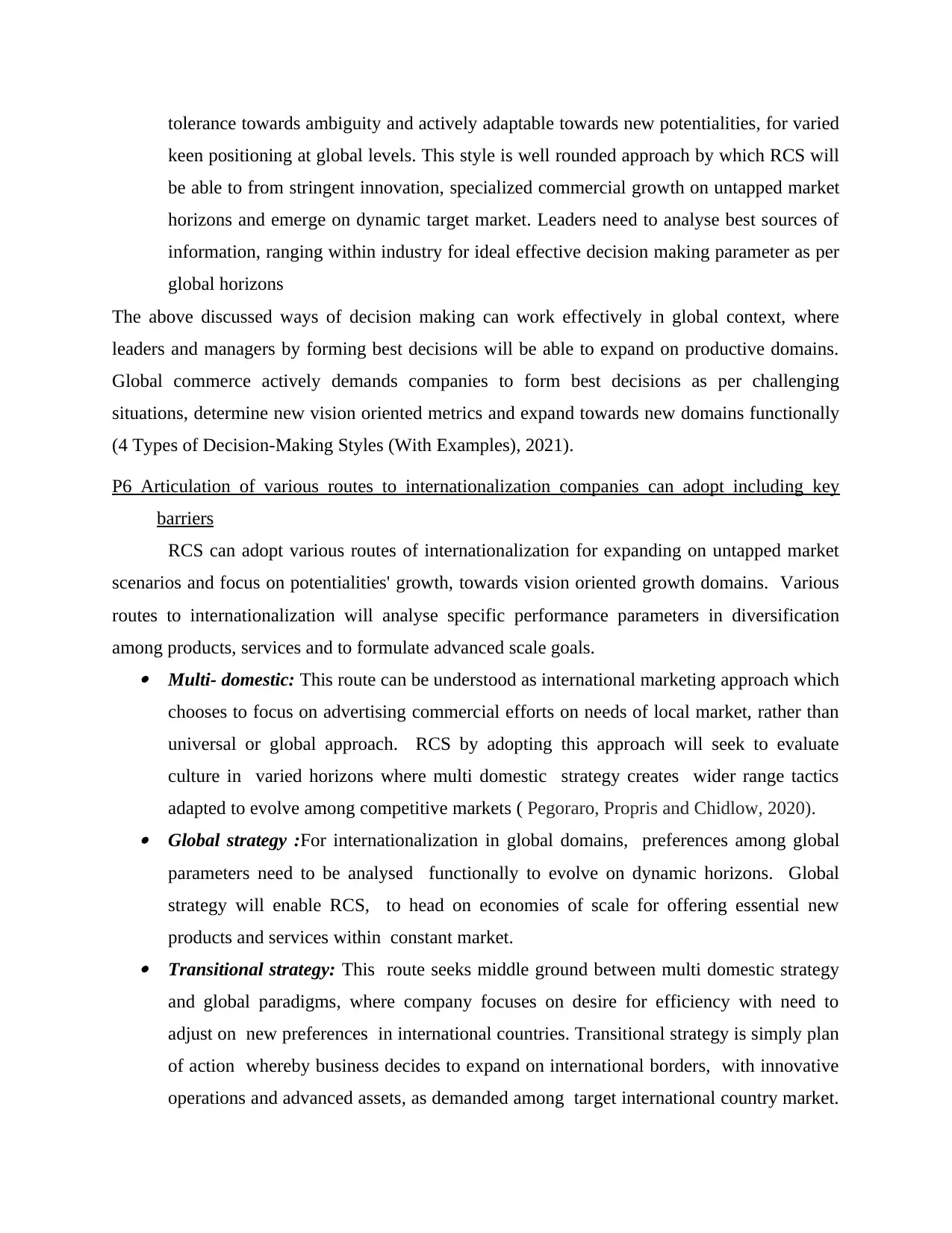
tolerance towards ambiguity and actively adaptable towards new potentialities, for varied
keen positioning at global levels. This style is well rounded approach by which RCS will
be able to from stringent innovation, specialized commercial growth on untapped market
horizons and emerge on dynamic target market. Leaders need to analyse best sources of
information, ranging within industry for ideal effective decision making parameter as per
global horizons
The above discussed ways of decision making can work effectively in global context, where
leaders and managers by forming best decisions will be able to expand on productive domains.
Global commerce actively demands companies to form best decisions as per challenging
situations, determine new vision oriented metrics and expand towards new domains functionally
(4 Types of Decision-Making Styles (With Examples), 2021).
P6 Articulation of various routes to internationalization companies can adopt including key
barriers
RCS can adopt various routes of internationalization for expanding on untapped market
scenarios and focus on potentialities' growth, towards vision oriented growth domains. Various
routes to internationalization will analyse specific performance parameters in diversification
among products, services and to formulate advanced scale goals. Multi- domestic: This route can be understood as international marketing approach which
chooses to focus on advertising commercial efforts on needs of local market, rather than
universal or global approach. RCS by adopting this approach will seek to evaluate
culture in varied horizons where multi domestic strategy creates wider range tactics
adapted to evolve among competitive markets ( Pegoraro, Propris and Chidlow, 2020). Global strategy :For internationalization in global domains, preferences among global
parameters need to be analysed functionally to evolve on dynamic horizons. Global
strategy will enable RCS, to head on economies of scale for offering essential new
products and services within constant market. Transitional strategy: This route seeks middle ground between multi domestic strategy
and global paradigms, where company focuses on desire for efficiency with need to
adjust on new preferences in international countries. Transitional strategy is simply plan
of action whereby business decides to expand on international borders, with innovative
operations and advanced assets, as demanded among target international country market.
keen positioning at global levels. This style is well rounded approach by which RCS will
be able to from stringent innovation, specialized commercial growth on untapped market
horizons and emerge on dynamic target market. Leaders need to analyse best sources of
information, ranging within industry for ideal effective decision making parameter as per
global horizons
The above discussed ways of decision making can work effectively in global context, where
leaders and managers by forming best decisions will be able to expand on productive domains.
Global commerce actively demands companies to form best decisions as per challenging
situations, determine new vision oriented metrics and expand towards new domains functionally
(4 Types of Decision-Making Styles (With Examples), 2021).
P6 Articulation of various routes to internationalization companies can adopt including key
barriers
RCS can adopt various routes of internationalization for expanding on untapped market
scenarios and focus on potentialities' growth, towards vision oriented growth domains. Various
routes to internationalization will analyse specific performance parameters in diversification
among products, services and to formulate advanced scale goals. Multi- domestic: This route can be understood as international marketing approach which
chooses to focus on advertising commercial efforts on needs of local market, rather than
universal or global approach. RCS by adopting this approach will seek to evaluate
culture in varied horizons where multi domestic strategy creates wider range tactics
adapted to evolve among competitive markets ( Pegoraro, Propris and Chidlow, 2020). Global strategy :For internationalization in global domains, preferences among global
parameters need to be analysed functionally to evolve on dynamic horizons. Global
strategy will enable RCS, to head on economies of scale for offering essential new
products and services within constant market. Transitional strategy: This route seeks middle ground between multi domestic strategy
and global paradigms, where company focuses on desire for efficiency with need to
adjust on new preferences in international countries. Transitional strategy is simply plan
of action whereby business decides to expand on international borders, with innovative
operations and advanced assets, as demanded among target international country market.
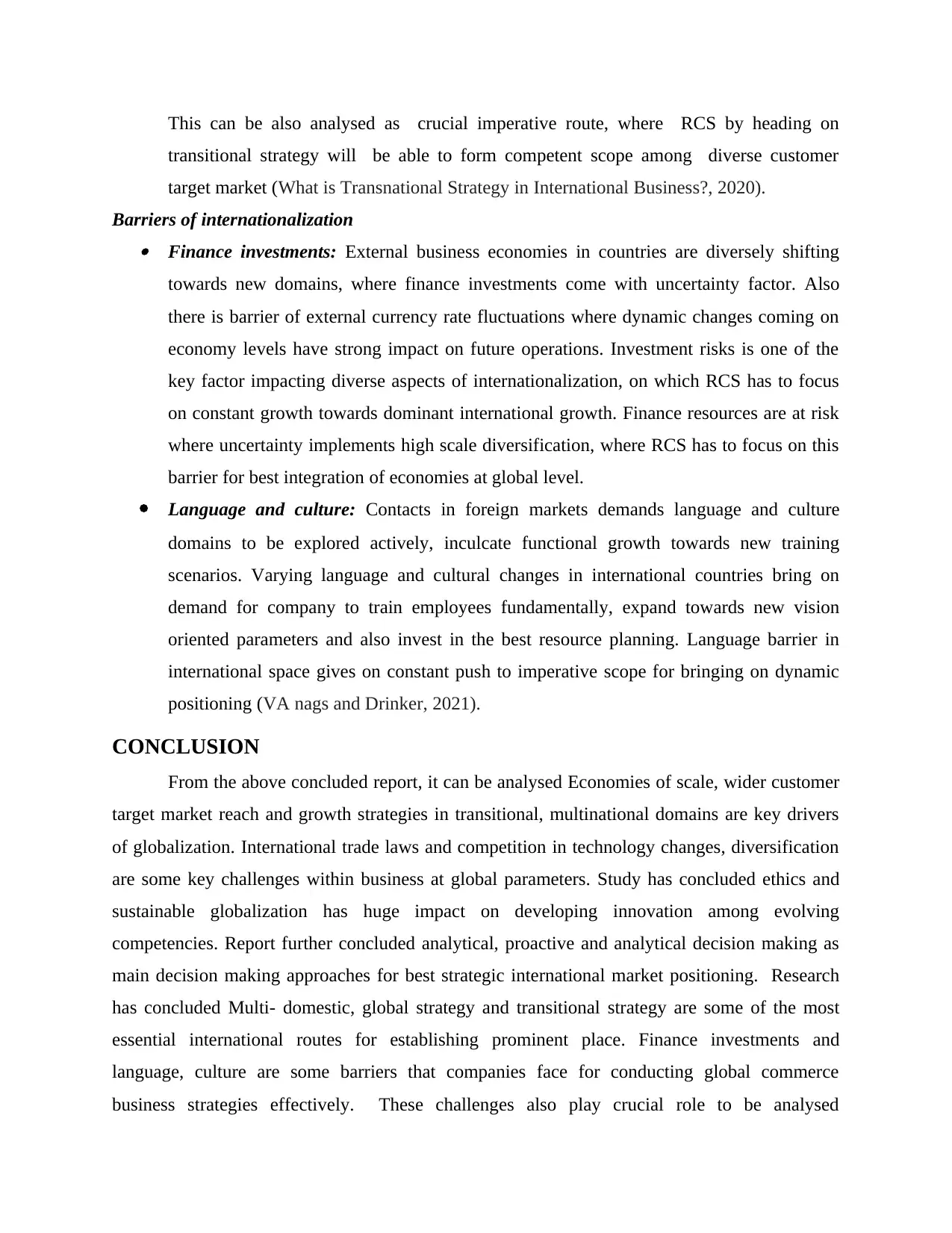
This can be also analysed as crucial imperative route, where RCS by heading on
transitional strategy will be able to form competent scope among diverse customer
target market (What is Transnational Strategy in International Business?, 2020).
Barriers of internationalization Finance investments: External business economies in countries are diversely shifting
towards new domains, where finance investments come with uncertainty factor. Also
there is barrier of external currency rate fluctuations where dynamic changes coming on
economy levels have strong impact on future operations. Investment risks is one of the
key factor impacting diverse aspects of internationalization, on which RCS has to focus
on constant growth towards dominant international growth. Finance resources are at risk
where uncertainty implements high scale diversification, where RCS has to focus on this
barrier for best integration of economies at global level.
Language and culture: Contacts in foreign markets demands language and culture
domains to be explored actively, inculcate functional growth towards new training
scenarios. Varying language and cultural changes in international countries bring on
demand for company to train employees fundamentally, expand towards new vision
oriented parameters and also invest in the best resource planning. Language barrier in
international space gives on constant push to imperative scope for bringing on dynamic
positioning (VA nags and Drinker, 2021).
CONCLUSION
From the above concluded report, it can be analysed Economies of scale, wider customer
target market reach and growth strategies in transitional, multinational domains are key drivers
of globalization. International trade laws and competition in technology changes, diversification
are some key challenges within business at global parameters. Study has concluded ethics and
sustainable globalization has huge impact on developing innovation among evolving
competencies. Report further concluded analytical, proactive and analytical decision making as
main decision making approaches for best strategic international market positioning. Research
has concluded Multi- domestic, global strategy and transitional strategy are some of the most
essential international routes for establishing prominent place. Finance investments and
language, culture are some barriers that companies face for conducting global commerce
business strategies effectively. These challenges also play crucial role to be analysed
transitional strategy will be able to form competent scope among diverse customer
target market (What is Transnational Strategy in International Business?, 2020).
Barriers of internationalization Finance investments: External business economies in countries are diversely shifting
towards new domains, where finance investments come with uncertainty factor. Also
there is barrier of external currency rate fluctuations where dynamic changes coming on
economy levels have strong impact on future operations. Investment risks is one of the
key factor impacting diverse aspects of internationalization, on which RCS has to focus
on constant growth towards dominant international growth. Finance resources are at risk
where uncertainty implements high scale diversification, where RCS has to focus on this
barrier for best integration of economies at global level.
Language and culture: Contacts in foreign markets demands language and culture
domains to be explored actively, inculcate functional growth towards new training
scenarios. Varying language and cultural changes in international countries bring on
demand for company to train employees fundamentally, expand towards new vision
oriented parameters and also invest in the best resource planning. Language barrier in
international space gives on constant push to imperative scope for bringing on dynamic
positioning (VA nags and Drinker, 2021).
CONCLUSION
From the above concluded report, it can be analysed Economies of scale, wider customer
target market reach and growth strategies in transitional, multinational domains are key drivers
of globalization. International trade laws and competition in technology changes, diversification
are some key challenges within business at global parameters. Study has concluded ethics and
sustainable globalization has huge impact on developing innovation among evolving
competencies. Report further concluded analytical, proactive and analytical decision making as
main decision making approaches for best strategic international market positioning. Research
has concluded Multi- domestic, global strategy and transitional strategy are some of the most
essential international routes for establishing prominent place. Finance investments and
language, culture are some barriers that companies face for conducting global commerce
business strategies effectively. These challenges also play crucial role to be analysed
⊘ This is a preview!⊘
Do you want full access?
Subscribe today to unlock all pages.

Trusted by 1+ million students worldwide
1 out of 14
Related Documents
Your All-in-One AI-Powered Toolkit for Academic Success.
+13062052269
info@desklib.com
Available 24*7 on WhatsApp / Email
![[object Object]](/_next/static/media/star-bottom.7253800d.svg)
Unlock your academic potential
Copyright © 2020–2026 A2Z Services. All Rights Reserved. Developed and managed by ZUCOL.




